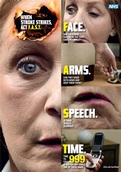Act FAST campaign brought back to screens for March
 The Act FAST ad campaign is returning to television screens this spring and will promote the easy to remember signs to look out for when checking someone who is possibly experiencing a stroke.
The Act FAST ad campaign is returning to television screens this spring and will promote the easy to remember signs to look out for when checking someone who is possibly experiencing a stroke.
The campaign has been brought back after its success last year with NHS England noting a 25per cent rise in stroke related 999 calls and a 19per cent rise in stroke sufferers being seen quicker.
Joe Korner, director of communications for the Stroke Association described the importance of calling an ambulance if someone suffers a stroke, saying: “A stroke is a brain injury caused by a blockage or bleed in the brain. Getting appropriate treatment fast reduces the amount of brain damage and improves the chance of making a good recovery.
Public Health Minister Anna Soubry said: “Despite being a treatable condition, stroke continues to be the third leading cause of death in England and the largest cause of adult disability. It does not need to be this way.
“The Act FAST campaign continues to save lives and prevent disability by showing us that anyone can be a stroke saver just by making sure they know how to spot the signs - and acting FAST if they see them.  “Treatment for stroke is improving, with more and more patients being seen in specialist stroke units. However, in order for stroke victims to get the treatment they need quickly, it’s essential that we are all aware of the signs and symptoms so we can Act FAST.”
“Treatment for stroke is improving, with more and more patients being seen in specialist stroke units. However, in order for stroke victims to get the treatment they need quickly, it’s essential that we are all aware of the signs and symptoms so we can Act FAST.”
The FAST test – FACE, ARMS, SPEECH, TIME identifies the most common symptoms of a stroke in three easy to recognise categories.
Although directed at the general public, it specifically is aimed at those over 55 who are more likely to suffer a stroke or be with someone who has had a stroke.
Mr Korner continued: “Stroke is a medical emergency, so it is essential everyone can recognise the signs and act. Time lost is brain lost.
“We are delighted that the Government is committed to sharing this important message which will save lives. At the Stroke Association, we work to challenge the many misconceptions about stroke. It is possible to treat stroke and every step on the road to recovery matters.
“Recovery starts when you call 999.”
Latest News
 29-Jul-24
Dementia Bus gives carehome.co.uk staff insight into life with dementia
29-Jul-24
Dementia Bus gives carehome.co.uk staff insight into life with dementia
 27-Jul-23
UK's top home care agencies in 2023 revealed
27-Jul-23
UK's top home care agencies in 2023 revealed
 30-Nov-22
A quarter of older people keep their falls secret from family
30-Nov-22
A quarter of older people keep their falls secret from family
 29-Nov-22
'Covid-19 has not gone away' say terminally ill
29-Nov-22
'Covid-19 has not gone away' say terminally ill
 28-Nov-22
IT consultant who received poor care opens 'compassionate' home care business
28-Nov-22
IT consultant who received poor care opens 'compassionate' home care business